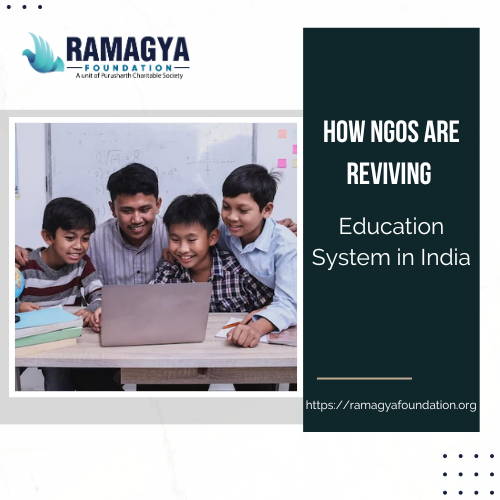In the heart of India’s diverse and vibrant landscape, the Education System in India stands as a beacon of hope for millions of children. It’s a realm where dreams are born, knowledge is nurtured, and futures are sculpted. However, this journey towards a brighter future is only equal for some. Many children, especially those from underprivileged backgrounds, are still deprived of quality education. This is where NGOs come into the picture, striving to bridge the gap and ensure every child gets a fair chance to explore the boundless possibilities of education.
The Evolution of the Education System in India
To understand the significance of NGOs in transforming the education system in India, we must first delve into the rich history of education in this land. In ancient India, education was not just about rote learning and textbook knowledge. Instead, it encompassed holistic development, emphasizing character building, values, and practical skills.
In a time when the world marveled at India’s educational system, the focus was on nurturing the individual’s mind, body, and soul. Students were encouraged to explore various fields, from mathematics and science to arts and philosophy. This comprehensive approach to education made India a hub for scholars and thinkers, attracting students worldwide.
What Were the Features of the Education System in Ancient India?
- Gurukul System: In ancient India, education was often imparted in Gurukuls or under the guidance of a revered Guru (teacher). This close relationship between teacher and student fostered academic growth and character development.
- Holistic Learning: The education system in ancient India was a holistic one. It focused on students’ physical, emotional, and intellectual development, encouraging them to become well-rounded individuals.
- Practical Skills: Besides academics, students were taught practical skills that would help them daily. This included knowledge of agriculture, medicine, and other vocational skills.
- Spiritual and Moral Values: Education was seen as a means to cultivate a solid moral character. Students were taught not just the ‘what’ and ‘how,’ but also the ‘why’ of life.
- Emphasis on Art and Culture: Ancient India’s education system encouraged creativity and innovation in art, culture, and philosophy. This helped in the flourishing of diverse forms of knowledge and expression.
Today, NGOs like the Ramagya Foundation are striving to reintegrate these values into the modern education system in India.
The Role of NGOs in Strengthening the Education System in India
- Access to Education: Many underprivileged children in India face barriers to education, such as poverty[1], lack of infrastructure, and discrimination. NGOs are working tirelessly to provide these children with quality education, ensuring they have the same opportunities as their more fortunate peers.
- Quality Education: NGOs focus on not just providing education but also on improving its quality. They work on teacher training, curriculum development, and the provision of learning materials to ensure that children receive a meaningful education that can transform their lives.
- Holistic Development: Just like in ancient India, NGOs emphasize holistic development. They provide extracurricular activities, vocational training, and guidance on character building to help children become well-rounded individuals.
- Inclusivity: NGOs in India are actively working to make education inclusive for children with disabilities, different learning needs, and those from marginalized communities. They ensure that no child is left behind.
- Community Engagement: NGOs often work closely with communities, involving parents and guardians in their children’s educational journey. This creates a sense of ownership and accountability in the community, leading to more sustainable and long-lasting change.
Conclusion: Shaping a Brighter Future
In the quest to strengthen the Education System in India, NGOs like the Ramagya Foundation are the unsung heroes. They carry forward the legacy of ancient India’s holistic and value-driven education while adapting it to the challenges of the modern world. These organizations are not just improving the quality of education; they are shaping the destiny of millions of underprivileged children and empowering them to break the cycle of poverty.
As a nation, India is standing at the cusp of transformation, and the power to lead this change lies in the hands of these young minds. By supporting and engaging with NGOs working tirelessly to uplift the underprivileged kids in India, we can collectively ensure that education becomes a beacon of hope for every child. Together, we can strengthen the education system, create a brighter future, and continue the legacy of ancient India’s commitment to nurturing the individual, mind, body, and soul.
Read our Article: A Brighter Future through Children’s Education
